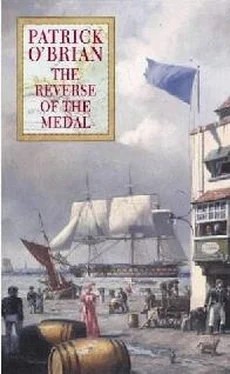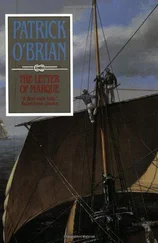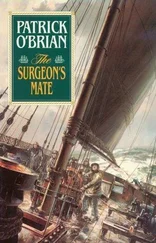'Why, Doctor,' said the Admiral, smiling benignly, 'you must often have seen it, I am sure - the blue flag with a white square in the middle that we hoist at the foretopmasthead to signify that we mean to sail directly. It is generally called the Blue Peter.'
'The Blue Peter! Oh, of course, of course. Thank you, Admiral - very many thanks indeed.'
'Not at all,' said the Admiral, chuckling. He carried on along the corridor while Stephen returned to his stairs and his room. There he tossed his three shirts off the elbow chair and sat down. His mind or perhaps his breast was filled with a tumult of emotions, some of them exquisitely painful. The series of incidents called up by the name of the flag and by the now comprehensible message had come back to him accurately and in great detail the moment Admiral Smyth gave his definition, yet now as he sat there staring at the blank window he went over the history again and again. The Blue Peter was a very large heart-shaped diamond, blue of course, that had belonged to Diana when she was in Paris earlier in the war, and it was an object that she delighted in, an object to which she was most passionately attached. She could live there perfectly well, since before she became a British subject again by marrying Stephen she was legally an American; and she was still there when Jack Aubrey's sloop the Ariel was wrecked on the Breton coast. Stephen was suspected of being an intelligence-agent and he and Jack, together with their companion Jagiello, an officer in the Swedish service, were taken to Paris and lodged in the Temple prison. It seemed likely that Stephen at least would be shot and Diana attempted to save him by bribing a minister's wife with the diamond, an act that very nearly sealed his fate by seeming to prove that he was an agent of great importance. They were in fact released, but for an entirely different reason: a body of influential men in Paris, headed by Talleyrand, were convinced that at this juncture Buonaparte could be put down and the war brought to an end if England would agree to a negotiated peace, and they needed an exceptional, well-introduced messenger to carry their proposals. Their agent, Duhamel, a senior member of one of the French intelligence services, put it to Stephen that he was the right man, and after a good deal of fencing Stephen agreed, his terms being the liberation of his companions and of Diana and the restitution of the diamond. The restitution of the diamond was politically impossible at such short notice, but it was promised at a later date. That was years ago, and there had been no word of the Blue Peter; indeed, so much had happened since then that the blaze of the great stone was now little more than the memory of a memory. 'It is an odd proposition,' he said, looking at the gannet's skin again, 'and not without its dangers.' He considered the possible disadvantages for a while - abduction, plain murder, and so on - and then said 'But all in all it is worth trying; and I can take the slow coach at noon. It will still get me there in time for Jack's holy tide, the tide that must on no account be missed.' He wrote a few lines stating that if the gentleman who had honoured him with the bones would present himself in the meadow at the end of the carriage-road in the Regent's park at half past eight o'clock tomorrow morning, Dr Maturin would be happy to meet him: Dr M begged that the gentleman might be unaccompanied and that he might carry a book in his hand. He took this down to the hall-porter, asked him to send a lad round to Frith Street, and returned to his packing. His packing was slow, laborious, and inefficient; there were plenty of skilled hands in the club who would have done it for him, but the habit of secrecy had so grown upon him, had become so nearly instinctive, that he did not like strangers to see even his shirts unfolded. It was his sea-chest that gave him most trouble: it had two trays and a little inner chest or till, and time and again he filled the whole and forced down the lid, only to find that one of these three was lying on his bed or behind the door. Towards midnight he had the entirety closed and locked, and then he perceived that the pair of pocket-pistols he meant to take with him in the morning were in the lowest compartment of all.
'Life is not worth it,' he said, and went to bed with Martin's pamphlet, an accurate, well-informed statement of abuses in the service, and in the present circumstances perhaps the most impolitic essay ever written by a naval chaplain; for Mrs Martin had brought him no fortune whatsoever and he had no benefice nor any prospect of a benefice - he had relied entirely upon Jack Aubrey's patronage, Jack Aubrey's permanence.
One of the reasons there was so much travelling between France and England was the presence of the Comte de Lille, the de jure King Louis XVIII, at Hartwell in Buckinghamshire. His advisers were constantly in touch with the various royalist groups, particularly those in Paris, and since some of Buonaparte's ministers thought it wise to insure against all eventualities they not only connived at this traffic but even sent emissaries of their own with messages that usually contained expressions of respect and good will but little else - nothing concrete. The number of these messengers rose and fell with Buonaparte's fortunes there had been very few lately - and the figures provided the British intelligence services with a fairly accurate idea of the climate of informed opinion in Paris.
'It will probably be one of them,' said Stephen, as his coach carried him swiftly towards the Regent's park. Yet on the other hand, he reflected, the French intelligence services had very soon taken to slipping their own people in among these messengers, or if not their own people then those uneasy particoloured creatures the double or even triple agents, and conceivably the sender of the bones might be one of these. Obviously it was a man who knew that Stephen had been invited to Paris to address the Institut de France on the solitaire, a man who knew of his connexion with the Royal Society and of the interchange between Banks and Cuvier; but that was no really close identification. Thoroughly undesirable people might also know these things. 'I am glad I dug out my pistols,' he said. 'Though how I shall ever bring myself to face that chest again, I do not know.'
'Here we are, my lord,' said the driver. 'And an uncommon quick run it was.'
'So we are,' said Stephen, 'and so it was.'
Yet in spite of their quick run he was not first at the rendezvous. Leaning on the white rails at the end of the road and looking out over the grass that stretched away and away to the north, Stephen saw a solitary figure pacing to and fro with a book in his hand.
There was no sun, but the high pale sky sent down a strong diffused light and Stephen. recognized the man almost at once. He smiled, ducked under the rail and walked out over the rough meadow towards the distant figure. Far to the west a flock of sheep were grazing, white on the vivid green: he passed a hare in her form, clapped close with her ears flat, persuaded she was invisible and so near he could have touched her, and at a suitable distance he called out 'Duhamel, I am happy to see you again,' taking off his hat as he did so.
Duhamel looked much older, much greyer, much more worn than when last they parted, but he returned Stephen's salute with equal cheerfulness and said that he too was delighted to see Maturin, adding that 'he hoped he saw him well'.
'I am truly sorry to have brought you to this remote spot,' said Stephen, 'but since I did not know who you were, it appeared to me that extreme discretion was best for all concerned. How clever of you to find it.' -
'Oh, I know it well,' said Duhamel. 'I was shooting here last autumn with my English correspondent. Unhappily we had only borrowed guns and wretched dogs, but I shot four hares and he shot two and a pheasant. We must have seen thirty or forty. Hares, I mean, not pheasants.'
Читать дальше
Конец ознакомительного отрывка
Купить книгу












